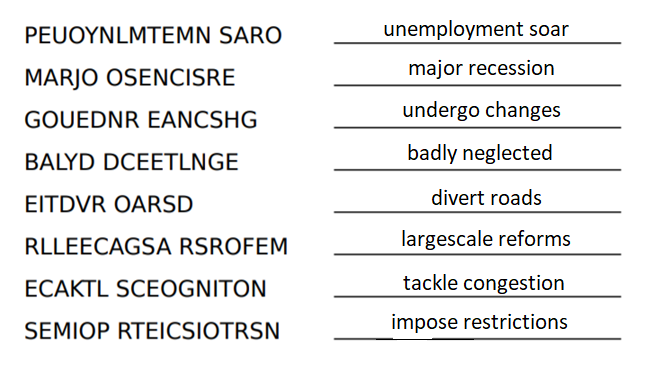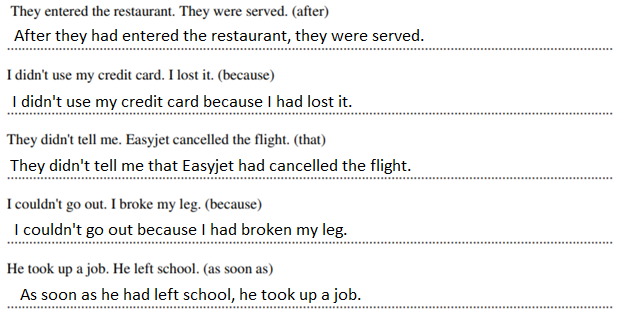
Advanced_vocab_test_1_Zabolotnikov_9373
.docxEx. 1: Read the definitions and find the appropriate words in the square below. The words go forward and backwards as well as up and down.
able to avoid being harmed by any risk, danger, or threat
energetic, exciting, and full of enthusiasm
not interesting or exciting in any way
extremely clean
containing extremely small drops of water in the air
having a lot of money or owning a lot of things
covered with buildings across a large area
too blocked or crowded and causing difficulties

Ex. 2: Match the verbs to the prepositions they go with and fill in the gaps in the sentences below.
spring |
from |
embark |
along |
choke |
to |
emerge |
off |
compel |
up |
crawl |
on |
show |
to |
grip |
on |
flock |
by |
Not limited by borders, it can spring up anywhere.
Did you tell her to roll me over on my stomach so I don't choke on my own vomit?
Unable to make a living from the land, many will flock to the cities.
In other words, we should embark on negotiations on nuclear disarmament.
With them in the lead, we'll crawl along like snails.
He trusted that appropriate arrangements would emerge from those discussions.
We need to compel him to confess to what he did.
But she was always happy to see a fresh face so she could show off her grandkids.
The city was gripped by golden fever, along many other disasters.
Ex. 3: Translate the sentences.
За выбрасывание мусора в неположенном месте тебя оштрафуют на крупную сумму!
You will get fined heavily for throwing garbage in inappropriate place.
Подавляющее большинство жителей города расположилось в трущобах.
Loads and loads of citizens are located in the slum.
Экономика региона переживает очередной кризис.
Region economic is surviving a regular downturn.
Многие обветшалые здания в районе необходимо снести.
Most down-town buildings in region need to be demolished.
Местная экология просто отвратительна! Воздух наполнен выхлопными газами.
The local ecology is awful! The air is filled with fumes.
Данные соревнования пробудили во многих школьниках неподдельный интерес.
These competitions aroused genuine interest in many students.
Овцы пасутся на лугу.
Sheep graze in the meadow.
При новом мэре город, наконец, процветает.
With a new mayor the city is flourishing.
Улицы идеально чистые, нигде нет ни следа мусора.
The streets are perfectly spotless. There’s no trace of garbage.
Ex. 4: Make the words out of the letters. Then use them to complete the sentences in the text below.

Due to COVID-19 pandemic, many businesses had to go bankrupt and a lot of employees were made redundant. It could be the only bad news for today but the truth is, most of these people cannot find a new place to work in. This leads us to an unemployment soar and yet another economic downturn. In order to avoid this major recession, the government embarked on a set of largescale reforms since many industries need to undergo some serious changes. The areas of our social life that have been badly neglected before the pandemic, now start to flourish and bring profits not only to the ones who pull the strings of power but also to us, ordinary citizens. One of such reforms is connected to the traffic and its drawbacks. Local authorities are discussing the necessity of diverting many main roads and imposing restrictions on car using. This might be the first step to tackling congestions and making out cities a better place for living.
Ex. 5: Match the halves of binomials and then use them to make your own sentences.
on |
and |
miss |
first |
tired |
|
long |
there |
|
hit |
foremost |
|
sick |
hard |
|
here |
off |
The garbage is thrown here and there.
First and foremost, we need to find your key!
I’m sick and tired of all of it!
The lamp was turning on and off when I came to my room.
Scientists tried long and hard to generate a formula.
May be it’s a sheep? – No! Too hit and miss.
Ex.
6:
Match the first parts of the phrases to their second ones. Each
phrase has one mistake (wrong prepositions are used), find and
correct it. Then use the phrases to fill in the gaps in the sentences
below.
Make on |
forward |
Back |
into one’s stride |
Stick for |
down |
Take everything |
to somebody |
Lighten |
one’s mind |
Suck on |
behind |
Get |
one’s principles |
Once he’s _______________, there’s nothing you can do to stop him.
It’s no use to _______________ after all the efforts you’ve made!
She is that kind of person who will _______________ their superiors to become successful.
Don’t you even try to challenge him. He’ll _______________ and will never lose his face.
They worked 24/7 in order to _______________ and look at them now, being in charge of the whole branch!
She _______________ even when everybody around her says otherwise.
Why don’t he _______________ a little? Such an attitude will bring him to the verge of alcoholism.
Ex. 7: Rewrite the sentences using SINCE or FOR and the verb provided. You may have to change some of the words but keep the meaning unchanged.
Example: Bill and Rita got married 20 years ago.
Bill and Rita have been married for 20 years. (be)
Jordan moved into this apartment in 2005.
Jordan has lived in his apartment sine he moved here in 2005. (live)
Ellen and Rose met each other 40 ears ago.
Ellen and Rose have known each other for 40 years. (know)
The teacher came to school at 8:00 this morning.
The teacher has been at school since 8:00 his morning. (be)
Robby grew a beard 6 months ago.
Robby has growing his beard for 6 months. (have)
Mark started to work at the bank 3 years ago.
Mark has worked at the bank for 3 years. (work)
Ex. 8: Join the sentences with expressions in brackets.
Example: They graduated. They got married.
They got married as soon as they had graduated. (as soon as)

________/80
